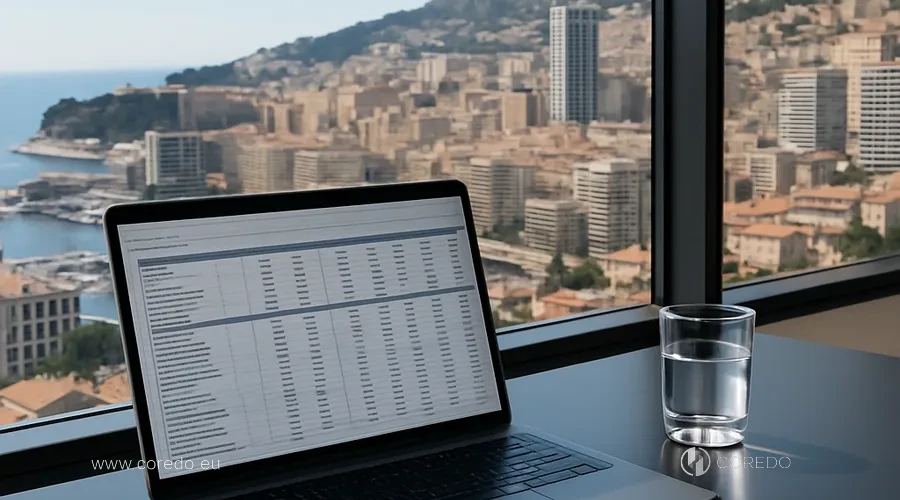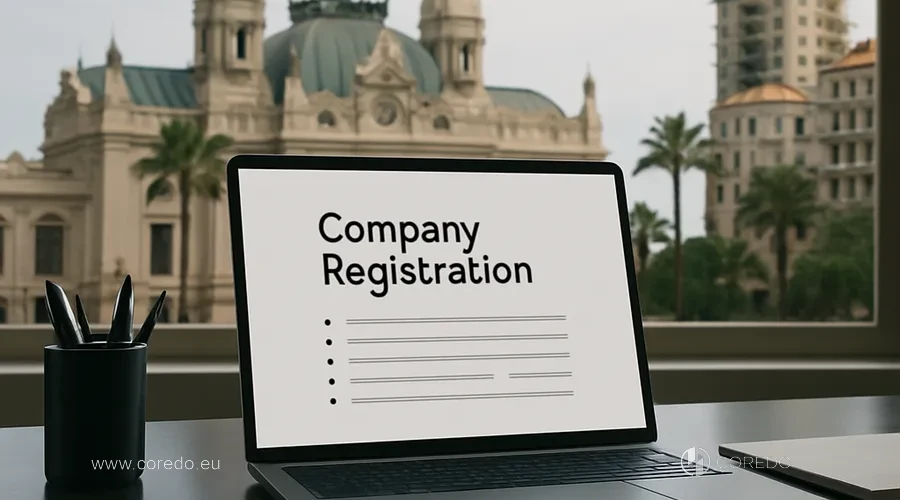- A transparent and stable legal system based on French civil law, but with a number of its own corporate features.
- Strict international AML/KYC standards: company registration in Monaco is accompanied by multi-level verification of sources of funds, beneficial ownership and corporate structure.
- A high level of asset protection and corporate transparency, which is especially important for structures with international investors and complex holding arrangements.
- Access to European and Asian markets: a company registered in Monaco can effectively participate in cross-border operations, use double taxation avoidance agreements and build flexible international tax planning.
- Monaco’s special offshore status: despite strict oversight, the jurisdiction remains attractive for structuring holding, investment and financial projects, as well as for scaling businesses.
Company registration in Monaco: stages

Opening a company in Monaco is a task that requires an exact understanding of procedures, timelines and disclosure requirements. The COREDO team has implemented dozens of projects related to the registration of legal entities in Monaco, and we have developed a clear algorithm that allows minimizing risks and speeding up the process.
Legal forms: SAM, SARL, Société Civile
The first key stage: determining the optimal legal form in Monaco:
- SAM (Société Anonyme Monégasque) – a classic joint-stock company suitable for large investment, holding and financial structures. The minimum share capital for an SAM in Monaco is 150,000 euros, a board of directors is required and mandatory publication of the articles of association in Journal de Monaco.
- SARL (Société à Responsabilité Limitée), the equivalent of a limited liability company, minimum capital 15,000 euros, simplified corporate structure, suitable for small and medium-sized businesses.
- Société Civile – a civil company not intended for commercial activities, used for property management, family offices and private assets.
| Legal form | Minimum capital | Number of founders | Main requirements | Restrictions on activity |
|---|---|---|---|---|
| SAM | 150,000 euros | 2+ | Board of directors, publication in Journal de Monaco, audit | No more than 8 companies per director |
| SARL | 15,000 euros | 2+ | Articles of association, corporate account, authorization | Restrictions on types of activity |
| Société Civile | None | 2+ | Articles of association, registration with the tax authority | Civil activities only |
Founding documents and business plan
At this stage the core of the future company is formed:
- Development of a business plan for company registration: a detailed description of activities, financial flows, ownership structure, market analysis and justification of economic presence (substance requirements).
- Preparation of founding documents: articles of association, meeting minutes, information on beneficial owners, corporate structure, share distribution and shareholders’ rights.
- Notarization of documents in Monaco, a mandatory procedure for legalizing the founding documents and confirming the founders’ powers.
After completing the stage of forming the company’s core, the procedure for obtaining an operating permit and undergoing a compliance check begins.
Operating permit and compliance
The next stage is obtaining an operating permit in Monaco through the Department of Economic Development.
- As part of the procedure, a comprehensive check is carried out for compliance with Monaco legislation, including analysis of sources of funds, the founders’ business reputation and the structure of beneficial ownership.
- It is important to ensure transparency in disclosing information about ultimate beneficiaries, prepare justification of the project’s economic feasibility, and compliance with international AML/KYC standards.
- For certain types of activities (financial services, crypto, payment systems), obtaining a separate license and implementing an internal financial monitoring system are required.
After completing this procedure, one can move on to the stage of opening a corporate account and contributing the share capital.
Open a corporate account and deposit the share capital
After obtaining the operating permit, a corporate account is opened at a Monaco bank.
- Monaco banks impose heightened requirements for KYC and AML: disclosure of information about beneficiaries will be required, provision of documents confirming the source of funds, and undergoing a comprehensive check of business reputation.
- The deposit of share capital is carried out only after opening the account, which is confirmed by a bank statement and the founders’ meeting minutes.
- It is important to consider substance requirements: having a real office, employees and economic presence in Monaco significantly increaseschances of successfully opening an account.
After receiving authorization to operate, you can move on to the next stage.
Registration of the articles of association and entry in the register
The final stage: publication of the company’s articles in the Journal de Monaco and registration in the Monaco Trade and Industry Register.
- Publication of corporate documents is a mandatory requirement for SAMs and a number of other forms: it ensures the company’s transparency and legitimacy, and informs the market of its establishment.
- Registration of amendments to the articles, maintenance of the shareholders’ register, publication of corporate changes, all these procedures are regulated by Monaco law and require strict compliance with deadlines and formalities.
Requirements for registering a business in Monaco

Monaco imposes high requirements for transparency, corporate governance, and the real presence of companies on its territory.
Requirements for the beneficiary, shareholder, and director
- All beneficial owners in Monaco must be disclosed, providing documents that confirm their identity, business reputation, and sources of funds.
- The legal responsibility of beneficial owners and directors is established by law: significant sanctions apply for false disclosure of information.
- Restrictions on directors’ activities: one director cannot manage more than 8 SAM companies, and for some types of activities the presence of a compliance officer with certified qualifications is required.
Requirements for substance and office
- Economic presence (substance requirements), a key criterion for recognizing a company as a tax resident of Monaco and gaining access to benefits in international tax planning.
- The need to have a real office, employees, corporate residence, and the company’s legal address.
- The business plan must contain justification of the economic feasibility of operating specifically in Monaco, and not in alternative jurisdictions.
Licensing of activities: what is it?
- For financial, investment, insurance, cryptocurrency, and a number of other businesses, a separate license is required for certain types of activities.
- The licensing procedure includes verification of directors’ qualifications, the presence of a compliance officer, and the implementation of internal AML policies and financial monitoring.
- Interaction with Monaco’s Department of Economic Development and the State Minister is a mandatory step to obtain authorization to operate.
Taxes and reporting of companies in Monaco

Taxes and reporting of companies in Monaco: these are key aspects that determine the financial activity and legal transparency of business in the principality. For successful operation, it is important to take into account the specifics of reporting and the differences in taxation of companies of different forms, including SAM and SARL.
Taxes for SAM and SARL: comparison of forms
- SAM and SARL companies conducting commercial activities outside Monaco may be eligible for a preferential tax regime; however, this requires confirmation of tax residency and economic presence.
- Corporate tax for companies whose more than 25% of income is generated outside Monaco is 33.33%. Exceptions are possible for purely local businesses.
- Dividends and profit distributions are not taxed at the shareholder level, provided substance requirements and transparency of the corporate structure are met.
- For cross-border operations, it is important to consider double tax avoidance agreements and features of international tax planning.
Annual reporting and audit: what is important?
- All SAMs and most SARLs are required to maintain full corporate accounting and audit, provide annual balance sheets, profit and loss statements, and undergo mandatory audits.
- Compliance and AML procedures in Monaco require the implementation of internal controls, appointment of a compliance officer, regular financial monitoring, and verification of the sources of funds.
- The automatic exchange of tax information (CRS) obliges companies to disclose data on accounts and beneficiaries under international agreements.
Company registration in Monaco: risks and alternatives

Company registration in Monaco may seem an attractive option due to a special tax regime and the prestige of the jurisdiction, but it is associated with a number of significant risks and restrictions for non-residents. It is important to take into account possible reasons for refusal in advance, and also consider existing alternatives in order to minimiminimize time and financial losses.
Reasons for refusal for non-residents
- The most common reasons for refusal: insufficiently transparent ownership structure, questionable business reputation of the founders, lack of confirmed economic presence and non-compliance with AML/KYC requirements.
- For non-residents, opening a corporate account is particularly challenging: Monaco banks thoroughly verify the sources of funds and may refuse without explanation.
- Failure to comply with beneficiary disclosure requirements, substance requirements or corporate governance leads to the risk of company liquidation or account blocking.
Comparison of alternative jurisdictions
- Among alternative jurisdictions for international investors are Cyprus, Luxembourg, Malta, Singapore, the UAE and the United Kingdom.
- Each of them has its own pros and cons in terms of taxation, substance requirements, compliance and market access.
- Monaco remains a unique venue for structuring assets but requires more thorough preparation and support.
Company registration in Monaco: step-by-step

Company registration in Monaco: step-by-step requires strict observance of official procedures. At each stage it is important to have a ready set of documents, as proper preparation is the key to successful and rapid business formation in the principality. Below is a checklist of documents required to start the registration process.
Documents for registration: checklist
- A business plan for company registration justifying the economic presence.
- Founding documents: articles of association, minutes, information about beneficiaries and the corporate structure.
- Documents confirming the business reputation of the founders and the sources of funds.
- Notarization of documents.
- Application for an activity permit, publication of the articles in the Journal de Monaco, registration in the trade and industry register.
- Opening a corporate account, contribution of share capital, registration of amendments to the constitutional documents.
Timeframes and costs: common mistakes
- Average registration period for a SAM company in Monaco is from 3 to 6 months; for a SARL, from 2 to 4 months.
- Corporate fees and charges depend on the company form and the extent of publication in the Journal de Monaco.
- Typical mistakes: incomplete documentation, insufficiently developed business plan, non-compliance with substance requirements, errors in beneficiary disclosure.
How to choose a consulting partner and a lawyer
- When choosing a partner for business registration in Monaco, focus on experience in handling complex compliance procedures, knowledge of local legislation and a track record in licensing financial activities.
- It is important to provide not only legal support during registration but also ongoing support: corporate compliance, audit, transaction support for M&A, implementation of AML/KYC systems.
- Appointing a compliance officer with international qualifications is a mandatory requirement for financial and investment companies.
Key tips for entrepreneurs
Registering a company in Monaco is not just a formal procedure but a strategic project that requires a deep understanding of corporate law, compliance, substance requirements and taxation specifics.
COREDO’s expertise and experience in supporting dozens of projects in Monaco allow us to highlight the following key recommendations:
- Take a strategic approach to choosing the legal form and corporate structure.
- Pay particular attention to preparing the business plan, disclosing beneficiary information and ensuring economic presence.
- Invest in high-quality legal support and compliance at all stages.
- Use Monaco’s opportunities for business scaling, asset protection and international tax planning.
- Minimize the risk of refusal and costs through thorough document preparation and implementation of best corporate governance practices.